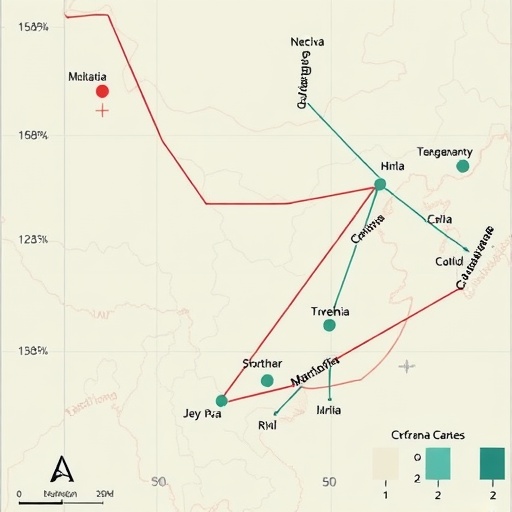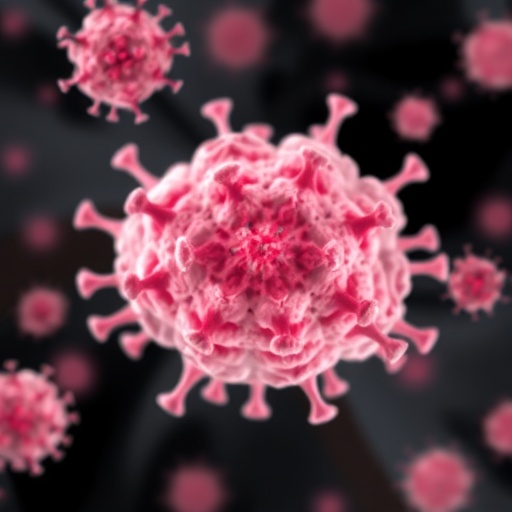
Recent research has unveiled a significant relationship between endometrial cancer and tumor-associated macrophages (TAMs), emphasizing the metabolic reprogramming that occurs in these immune cells within the tumor microenvironment. This study, spearheaded by Liu, Sun, and Liang, explores how lactate, a byproduct of metabolic processes, induces M2 polarization of macrophages, thereby contributing to tumor progression.
Endometrial cancer, a malignant growth that originates in the lining of the uterus, is a major health concern, particularly among women. Its incidence is on the rise globally, making it a crucial area for medical research. Understanding the underlying mechanisms of tumor development is essential for devising effective treatment strategies. The study highlights a fundamental aspect of cancer biology—the metabolic interactions between cancer cells and their microenvironment can significantly influence disease outcomes.
The researchers focused on tumor-associated macrophages, a type of immune cell that, when polarized to the M2 state, can promote tumor growth and metastasis. Unlike their M1 counterparts that have anti-tumor properties, M2 macrophages are associated with tissue repair and the suppression of inflammation. This dichotomy in macrophage behavior underscores the complexity of the immune response in cancer.
Lactate has been recognized as more than just a waste product of anaerobic respiration; it plays a vital role in cellular signaling and metabolism. The study reveals that high levels of lactate found in the tumor microenvironment can polarize macrophages towards the M2 phenotype. This process enhances the tumor-promoting activities of macrophages, leading to a feedback loop that accelerates cancer progression.
In dissecting the molecular pathways involved, Liu et al. demonstrate that lactate activates specific signaling cascades in macrophages, altering their gene expression profiles. These changes favor the M2 polarization, characterized by the upregulation of anti-inflammatory cytokines and genes involved in tissue remodeling. Such metabolic reprogramming not only facilitates tumor growth but also hinders the action of anti-tumor immunity, creating a favorable environment for cancer cells to thrive.
The implications of these findings extend beyond endometrial cancer and could apply to various malignancies characterized by a similar metabolic interplay. As cancer cells and tumor-associated macrophages coexist and interact, manipulating this metabolic relationship presents a potential therapeutic avenue. Targeting lactate metabolism or the specific signaling pathways driving M2 polarization in macrophages could enhance the efficacy of current cancer treatments.
Moreover, this research emphasizes the importance of considering the tumor microenvironment in cancer therapies. Traditional approaches often focus solely on the tumor cells, neglecting the intricate web of interactions that facilitate tumor growth and immune evasion. A holistic view that includes the metabolic behaviors of associated immune cells is crucial for developing more effective interventions.
Future studies will likely explore the therapeutic potential of reversing M2 polarization in tumor-associated macrophages. Investigating agents that can inhibit lactate production or block the signaling pathways that promote M2 characteristics could revolutionize the treatment landscape for endometrial cancer and potentially other malignancies.
Furthermore, the study highlights the importance of interdisciplinary collaboration in cancer research. Integrating insights from oncology, immunology, and metabolism might yield innovative approaches to combat resistant tumors. The confluence of these fields offers a rich platform for uncovering new targets and strategies in cancer therapy.
In conclusion, the research by Liu, Sun, and Liang provides compelling evidence of the metabolic interplay between endometrial cancer and tumor-associated macrophages. Their findings illuminate the role of lactate-induced M2 polarization in enhancing tumor progression, opening new avenues for treatment strategies that consider the tumor microenvironment. As we advance our understanding of these interactions, the promise of more personalized and effective cancer therapies becomes increasingly attainable.
Notably, this study serves as a clarion call for reexamining existing treatment paradigms in oncology. Emphasizing metabolic reprogramming and immune cell behavior could correlate with better patient outcomes. As cancer research evolves, integrating these perspectives will be essential in the quest to outmaneuver a disease as relentless as cancer.
The findings of Liu et al. serve as a testament to the complexity of cancer biology and the importance of unraveling the multifaceted relationships within the tumor microenvironment. This pioneering work paves the way for future investigations focused on utilizing metabolic pathways for therapeutic advantage, encouraging a more nuanced approach to cancer treatment.
As the landscape of cancer therapy continues to shift, ongoing research will be pivotal in refining our understanding of tumor cell interactions and the immune system. Key to this effort will be leveraging the insights gathered from studies like this one, which stress the metabolic dependencies of tumors, thereby providing vital clues in the relentless pursuit of cancer eradication.
Subject of Research: Interaction between endometrial cancer and tumor-associated macrophages through lactate metabolism.
Article Title: Metabolic interplay between endometrial cancer and tumor-associated macrophages: lactate-induced M2 polarization enhances tumor progression.
Article References:
Liu, X., Sun, H., Liang, J. et al. Metabolic interplay between endometrial cancer and tumor-associated macrophages: lactate-induced M2 polarization enhances tumor progression. J Transl Med 23, 923 (2025). https://doi.org/10.1186/s12967-025-06235-6
Image Credits: AI Generated
DOI: 10.1186/s12967-025-06235-6
Keywords: endometrial cancer, tumor-associated macrophages, lactate, M2 polarization, tumor progression, cancer metabolism.
Tags: cancer microenvironment interactionsendometrial cancer progressionimmune response in endometrial cancerinflammatory response in cancer biologylactate-induced M2 macrophagesM2 macrophages and tumor metastasismacrophage polarization and tumor growthmetabolic factors in tumor developmentmetabolic reprogramming in tumorstherapeutic strategies for endometrial cancertumor-associated macrophages in cancerwomen’s health and cancer research




